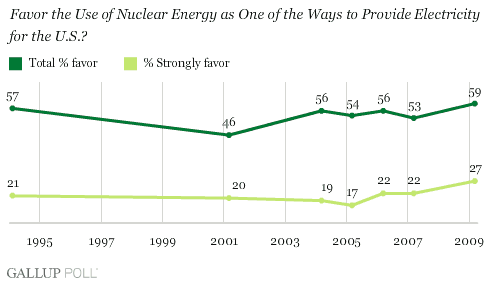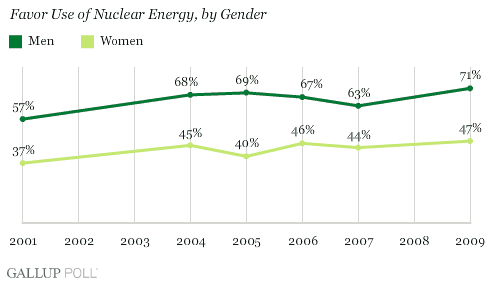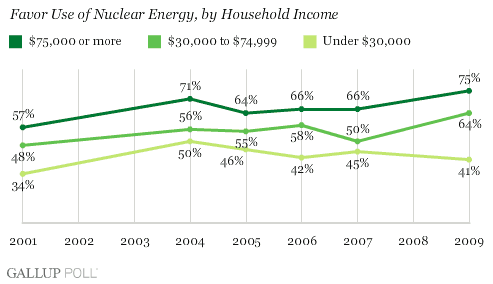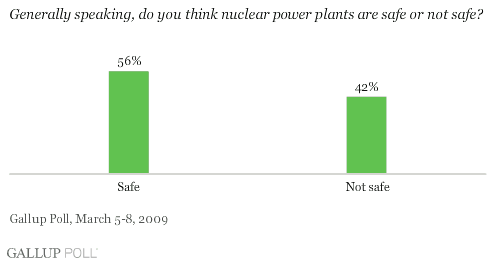PRINCETON, NJ -- A majority of Americans have been supportive of the use of nuclear energy in the United States in recent years, but this year's Gallup Environment Poll finds new high levels of support, with 59% favoring its use, including 27% who strongly favor it.

Support for nuclear energy had been fairly steady in the mid-50% range since Gallup first asked about it in 1994, apart from a 46% reading in 2001. The percentage who say they strongly favor nuclear energy had also been fairly stable at around 20%, before increasing to 27% this year.
Gallup has always found consistent and large gender differences in Americans' views of nuclear power, and the same applies this year -- 71% of men favor the use of nuclear energy, compared with only 47% of women. Both groups show their highest level of support for nuclear power to date.

Additionally, upper-income Americans have consistently favored nuclear energy at much higher levels than lower-income respondents. This year, 75% of Americans whose total annual household incomes are at least $75,000 favor using nuclear power to produce electricity in the United States, compared with just 41% of those in households with annual incomes of less than $30,000. Only once in the last eight years has support reached 50% among the low-income group.

This year, both Republicans and Democrats show their highest level of support for using nuclear energy since 2001. However, Republicans continue to be much more in favor of it than Democrats are, 71% to 52%.

Safety of Nuclear Power
Americans may have not fully embraced the use of nuclear energy because of concerns about potential health risks from a nuclear meltdown or the nuclear waste that power plants produce. The poll finds that a majority of Americans, 56%, believe nuclear power plants are safe, but a substantial minority of 42% disagree.

Opinions about the safety of nuclear power vary by subgroup in much the same way they do on the basic favor/oppose question.
- For example, 72% of men but only 41% of women believe nuclear power plants are safe.
- Upper-income respondents (75%) are more than twice as likely as lower-income respondents (36%) to say nuclear power plants are safe.
- And while 73% of Republicans are confident in the safety of nuclear power plants, only 46% of Democrats agree.
Implications
There are clearly challenges to expanding nuclear energy use in the United States. Although most Americans support the use of nuclear energy, the level is hardly an overwhelming majority. And there remain concerns among a substantial minority of Americans about the safety of nuclear power plants. Indeed, in prior years, Gallup has found Americans reluctant to support the construction of nuclear power plants in their local communities.
President Obama has said that nuclear power is part of his overall plan to expand the use of alternative energy in the United States, and if public support for it continues to grow, it would seem likely that more Americans would come to rely on nuclear energy.
Survey Methods
Results are based on telephone interviews with 1,012 national adults, aged 18 and older, conducted March 5-8, 2009. For results based on the total sample of national adults, one can say with 95% confidence that the maximum margin of sampling error is ±3 percentage points.
Each question reported here was asked of a random half-sample of approximately 500 adults, and the margin of sampling error for each is ±5 percentage points.
Interviews are conducted with respondents on land-line telephones (for respondents with a land-line telephone) and cellular phones (for respondents who are cell-phone only).
In addition to sampling error, question wording and practical difficulties in conducting surveys can introduce error or bias into the findings of public opinion polls.
